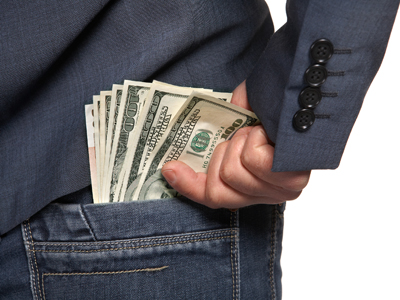
A buyer who I have been consulting with on the BizBen ProBuy Program is looking to buy a liquor store (and possible other "cash" oriented businesses). They asked me how they should verify cash being generated by the business and how to go about conducting due diligence, considering that these are mostly all-cash businesses. This buyer also wanted to know if the seller's suggestion about having an observation last one week, is a long enough period of time to verify income.
My answer to this potential business buyer was basically this (but I know there are probably many other solutions to this situation that I am not aware of):
This question comes up frequently from buyers of mostly cash based businesses. They don't have the benefit of a "money trail" to examine, as do buyers who conduct due diligence on a company that sends invoices to its customers and posts all transactions in some kind of record that can then be verified with bank statements.
There is no fool-proof way to verify sales of an all-cash business unless the buyer is "stationed" on premises for several days during the time the business is open, to make note of every transaction. And even that's not a perfect method. Sellers have been known to ask friends and relatives to come to the business, pretend to be strangers, and make a purchase during the due diligence period. That tactic could give the buyer the impression the business conducts more sales and collects more money than is normally the case. And I know of a situation in which a buyer "observed" a gift shop during an unusually slow period. She didn't believe the seller's explanation that there's usually more business than occurred during the due diligence week. Another buyer with a back-up offer was able to close a deal on the business. The first buyer later learned that sales had, in fact, been slower than usual during her due diligence observation, and was sorry she didn't believe the seller's explanation.
Sellers aren't always agreeable to the idea of someone "lurking" around their place of business for a week or longer, because it can disturb customers and employees. And it might be obvious that the business is for sale if people conclude that the person is checking out the amount of sales conducted. A typical seller solution is that he or she will save each day's cash register tape, if the business has that capability, for examination by the buyer after the business closes. That's only an effective way to conduct due diligence if the seller is careful to ring up the exact amount of each transaction, and not post exaggerated amounts or ring-up "make believe" sales.
One solution a buyer proposed was that different members of his family would come to observe at different times, acting like customers. Another suggestion was that the buyer be permitted to operate the cash register, under the pretense that he was a new employee being trained, during what actually was the due diligence period. That worked well in connection with a deal for a dry cleaning plant. Due diligence began the day after the agreement was signed so the money collected, at least during the first few days, would represent work on garments and linen that had been brought in before the sales agreement. There was no chance the business had been "staged" with customers.
The seller who brags that there is more income than is shown on the books - that some of the cash goes directly into his pocket, is likely to be just as dishonest with a buyer as with the taxing authorities.
There is no established period of time over which due diligence should be conducted. The custom is a ten day or two-week period during which the buyer looks into the business more thoroughly than when he was viewing it before and during negotiations. Many, if not most deals call for a two-week due-diligence period. Sellers reluctant to let the buyer have that much time might have something to hide, but more likely just doesn't want the due diligence process to disrupt the business and "frighten" employees, customers, and vendors.
Rather than insisting on a very short due diligence period, the seller might look at that investment of time as legal insurance, reducing the likelihood of the buyer claiming there was not enough time to really analyze the business and then suing the seller for misrepresenting critical facts about the business offering.
----------------------
So fellow BizBen Users - what words of wisdom, tips would you have for buyers who are looking to buy cash based businesses - how do you deal with these types of businesses and verify their claims of income, etc? What strategies would you suggest buyers implement to verify income and feel comfortable with this type of business purchase - both in the pre-sale and due diligence stages of a possible business purchase? Please give your thoughts, examples of past deals, and ideas via the Comments section below.







 This is a tough situation and all of Peter's suggestions are beneficial, depending on the situation. No one method works for all transactions and I would counsel a buyer to use a few redundant methods to be truly confident in their conclusions about the "off-books" cash.
This is a tough situation and all of Peter's suggestions are beneficial, depending on the situation. No one method works for all transactions and I would counsel a buyer to use a few redundant methods to be truly confident in their conclusions about the "off-books" cash.